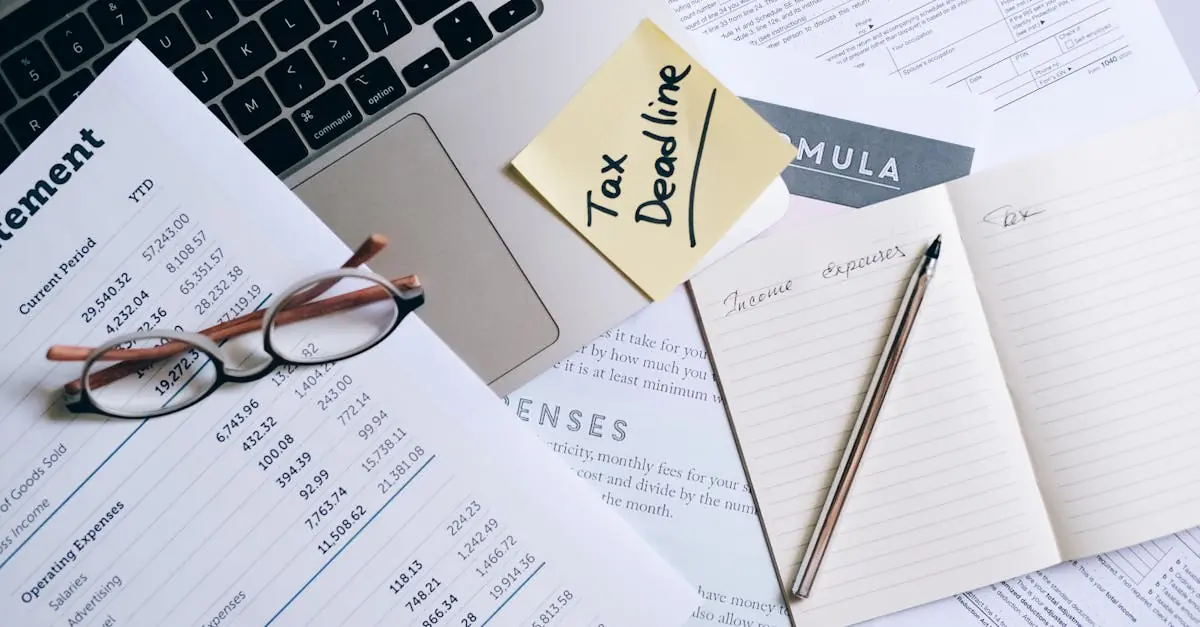In a world where avocado toast can cost more than a small car, mastering personal finance skills isn’t just smart—it’s essential. Picture this: someone juggling bills, savings, and that irresistible online sale, all while trying to keep their sanity intact. It’s a financial circus out there, and without the right skills, they might just end up as the clown.
Personal finance isn’t just about crunching numbers; it’s about empowering individuals to take control of their financial future. From budgeting like a boss to investing with confidence, these skills can transform chaos into clarity. So why not trade in that financial anxiety for a roadmap to success? After all, a little knowledge can turn a tight budget into a thriving bank account, and who wouldn’t want that?
Table of Contents
ToggleOverview of Personal Finance Skills
Mastering personal finance skills equips individuals to navigate their financial landscapes effectively. Key skills include budgeting, saving, and investing, all crucial for financial stability. Budgeting allows one to track income and expenses, providing clarity on spending habits. Using budgeting tools can create a solid plan, ensuring essential expenses are prioritized.
Saving serves as a safety net for unforeseen circumstances. Establishing an emergency fund enables individuals to manage unexpected financial challenges without resorting to debt. Suggestions often recommend saving at least three to six months’ worth of expenses for adequate protection.
Investing unlocks opportunities for wealth growth. Individuals can build portfolios through various avenues, such as stocks, bonds, or mutual funds. Knowledge of risk management and diversification helps mitigate potential losses while optimizing returns. Resources like investment apps and educational platforms make entry into investing more accessible to novices.
Understanding credit scores impacts financial decisions significantly. Maintaining a positive credit score lowers borrowing costs and enhances loan approval chances. Regularly reviewing credit reports aids in identifying errors and managing debts effectively.
Personal finance literacy fosters informed decision-making. When individuals grasp these skills, they develop confidence in their abilities, ultimately leading to improved financial outcomes. Continuous learning about market trends and financial strategies maximizes opportunities for long-term success.
The combination of these personal finance skills sets the foundation for financial health. Collective mastery enables individuals to transform their financial situations from chaotic to controlled, ensuring they’re well-prepared for the future.
Importance of Personal Finance Skills
Personal finance skills significantly affect an individual’s financial stability and overall well-being. Mastering these skills leads to informed decision-making and greater confidence in financial matters.
Financial Literacy and Decision Making
Financial literacy equips individuals with knowledge that influences their choices. Understanding concepts such as interest rates, investment options, and credit ratings helps individuals make informed decisions. Individuals who grasp these fundamentals manage debts effectively, navigate financial products, and evaluate risk. Superior financial literacy reduces stress and empowers individuals to pursue financial goals confidently. Learning about financial instruments creates opportunities for wealth accumulation. Access to accurate information prevents costly mistakes and promotes financial security.
Budgeting as a Fundamental Skill
Budgeting serves as the backbone of financial management. It allows individuals to track income and expenses, ensuring that spending aligns with financial goals. A well-structured budget identifies areas for improvement and enables individuals to allocate funds efficiently. Establishing a budget also fosters discipline, creating a habit of mindful spending. Leaders in personal finance recommend saving at least three to six months’ worth of expenses as part of a comprehensive budget strategy. Habitual budgeting leads to increased savings and investment potential. Ultimately, mastering budgeting supports long-term financial health.
Impact on Long-Term Wealth Building
Mastering personal finance skills plays a vital role in building long-term wealth. These skills provide the foundation for sound financial decisions.
Investing Knowledge and Strategies
Investing strategies enable individuals to grow their wealth over time. Understanding the fundamentals of stocks, bonds, and mutual funds creates opportunities for portfolio diversification. Knowledge of the market’s fluctuations helps in timing investments effectively. Learning about risk tolerance allows for informed choices that align with financial goals. Many investment options, such as index funds, offer low fees and broad exposure to the market. Educating oneself about these strategies promotes a proactive approach to wealth-building, fostering a mindset for financial growth.
Saving Habits and Emergency Funds
Establishing saving habits is crucial for financial security. Regular contributions to savings accounts help build a substantial emergency fund. Financial experts recommend saving three to six months’ worth of living expenses to cover unexpected events. Creating a separate savings account for emergencies prevents the need to rely on credit. Automating these savings can simplify the process and encourage consistent contributions. Strong saving habits not only provide peace of mind but also support long-term financial goals. Investing in savings makes it easier to navigate life’s uncertainties and seize future opportunities.
Personal Finance Skills and Mental Well-Being
Personal finance skills significantly influence mental well-being, reducing stress and fostering confidence in financial decisions.
Stress Reduction through Financial Management
Effective financial management leads to lower stress levels. Understanding budgeting empowers individuals to efficiently allocate their resources. When people track their incomes and expenses, they gain clarity and control over their financial situations. For instance, maintaining an emergency fund alleviates worries during unexpected situations. Studies show that individuals with solid financial plans report reduced anxiety. Furthermore, mastering skills like saving and investing allows for better long-term planning. Overall, a well-managed budget not only stabilizes finances but also enhances overall mental health.
Confidence in Financial Choices
Confidence in financial decisions stems from financial literacy. When individuals grasp essential concepts like credit scores and investment options, they feel more secure in their choices. This understanding encourages proactive decision-making and less reliance on external advice. For example, a person knowledgeable about interest rates can negotiate better loan terms. With each successful financial decision, confidence grows. Empowered individuals often take calculated risks that pave the way for wealth accumulation. As mastery of personal finance skills increases, so does self-assuredness in pursuing financial goals.
Mastering personal finance skills is essential for anyone looking to secure their financial future. It not only enhances an individual’s ability to manage daily expenses but also builds a strong foundation for long-term wealth. With effective budgeting saving and investing practices individuals can navigate financial challenges more confidently.
The benefits extend beyond financial stability as improved financial literacy fosters mental well-being and reduces stress. By taking control of their finances individuals empower themselves to make informed decisions and pursue their goals. Ultimately the mastery of personal finance skills leads to a more secure and fulfilling life.




